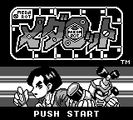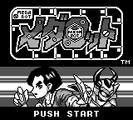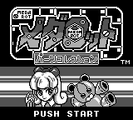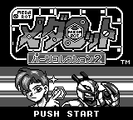Game Boy: Difference between revisions
From Medapedia
Jump to navigationJump to search
mNo edit summary |
|||
| Line 8: | Line 8: | ||
* [[Medarot 1 Parts Collection]] (Compatible with Super Game Boy) | * [[Medarot 1 Parts Collection]] (Compatible with Super Game Boy) | ||
* [[Medarot 1 Parts Collection 2]] (Compatible with Super Game Boy) | * [[Medarot 1 Parts Collection 2]] (Compatible with Super Game Boy) | ||
<gallery widths=144px> | |||
File:Medarot (Kabuto) Title Screen (Game Boy).png|[[Medarot 1|Medarot Kabuto version]] | |||
File:Medarot (Kuwagata) Title Screen (Game Boy).png|[[Medarot 1|Medarot Kuwagata version]] | |||
File:Medarot Parts Collection Title Screen (Game Boy).png|[[Medarot 1 Parts Collection|Medarot Parts Collection]] | |||
File:Medarot Parts Collection 2 Title Screen (Game Boy).png|[[Medarot 1 Parts Collection 2|Medarot Parts Collection 2]] | |||
</gallery> | |||
Some Game Boy Color games are compatible with the Game Boy, suffering a color downgrade but gaining special borders if used on the [[Super Game Boy]]. | Some Game Boy Color games are compatible with the Game Boy, suffering a color downgrade but gaining special borders if used on the [[Super Game Boy]]. | ||
Revision as of 11:21, 27 July 2024
Game Boy (ゲームボーイ Gēmubōi), Nintendo's iconic handheld console, was first released in 1989. It stands as the second best-selling handheld console of all time, surpassed only by its successor, the Nintendo DS. Notably, like all systems in the Game Boy family, it is not region-locked. Gunpei Yokoi is recognized for his pivotal role in the Game Boy's development and launch.
Medarot games
The Game Boy was the birth console for several Pokémon-like franchises, including the Medarot series. It's especially known for containing games starring Hikaru Agata's era.
- Medarot 1 (Compatible with Super Game Boy)
- Medarot 1 Parts Collection (Compatible with Super Game Boy)
- Medarot 1 Parts Collection 2 (Compatible with Super Game Boy)
Some Game Boy Color games are compatible with the Game Boy, suffering a color downgrade but gaining special borders if used on the Super Game Boy.
- Medarot 2 (Compatible with Super Game Boy)
- Medarot 2 Parts Collection (Compatible with Super Game Boy)
- Medarot Cardrobottle (Compatible with Super Game Boy)



